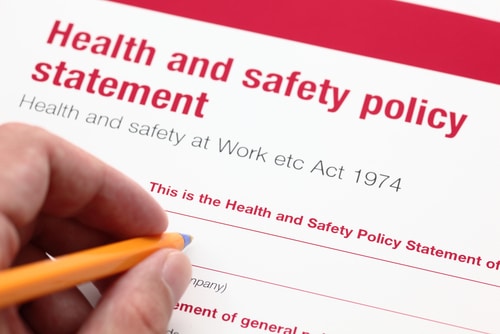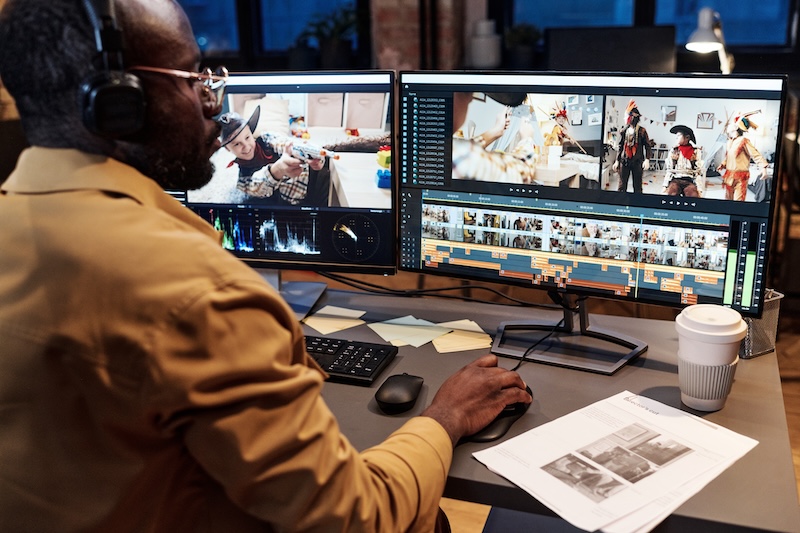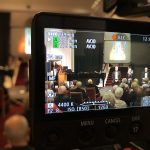Why a Safety Statement is important?
In life, there is always an element of risk in terms of one’s own health and safety. The goal of course is to try and reduce the risk. In film, tv and video production, this is especially true. There are so many moving parts to a production, large or small. There could be stunt performers, there could be pyrotechnics or there could be interaction with water, all of which increase risk. That is why a Safety Statement is a vital part of a production company and vital for employees to receive.
What is a Safety Statement?
The goal of a safety statement in film, tv and video production is to inform cast, crew and contractors about the safety protocols implemented by the production company in keeping with national or international safety regulations.
Where can I get a Safety Statement?
You should always make sure you author your own safety statement and understand its contents. A good start is to look an industry standard template which you can download here or see below.
EXAMPLE SAFETY STATEMENT FOR FILM, TV AND VIDEO PRODUCTION
ABC Productions Limited
1 Main Street, Dublin
Tel: +353(0) 1 111 1111
Health & Safety Regulations /Code of Practice involved in the assessed activities include:
The Health & Safety at Work Act 1974: The Management of Health & Safety at Work Regulations 1999: The Electricity at Work Regulations 1989 & the institute of Electrical Engineers Regulations: Fire Precautions Regulations 1971 & the Fire Precautions 9Workplace) Regulations 1997: The Workplace (Health, Safety & Welfare) Regulations 1992.
FOREWORD
This safety statement is based upon the sentiments included in the voluntary agreement between, Irish Actors Equity, SIPTU, FMI, Screen Training Ireland and representatives of the Insurance Industry.
A copy of the draft manual may be viewed by any employee at any time, and may be obtained from the producer.
The statement will address various departments in production, and from time to time will include specific statements and instructions according to the nature of the production.
WARDROBE
To avoid Repetitive Strain Injury, (RSI), the production office shall endeavour to ensure on set that chairs, workbenches and machines help in the maintenance of good posture, and floor covering in concreted areas to the problems caused by standing for long periods. Employees should vary tasks frequently, and report any areas where they feel flooring, chairs, machines, workbenches and lighting are inadequate.
Production shall consult with Wardrobe department when choosing fabrics, giving consideration to climatic conditions, skin conditions, eczema and allergies to particular fabrics.
When reverse season filming is taking place, production shall consult with Wardrobe.
When flash, fire or flame effects are to be used, Wardrobe will be notified in ample time for consultation with the SFX team by the producer.
Where actors are expected to remain in costume for long periods of time, Production shall ensure that there are adequate resting facilities.
Actors shall not be required to wear costumes worn by others that have not been laundered.
Footwear shall at all times be appropriate to the action and location.
MAKE – UP
Make up artists must report any skin problem or eye injury to the production office.
Actors’ requests to remove their own makeup shall be notified to the production office.
Production shall give adequate attention to the scheduling of make up calls, in particular where special effects make up is required.
Smoking, eating and drinking, (with the exception of water), are not permitted in the make-up room.
Storage of hazardous make up or make up effects, must be in accordance with National regulations.
CHILDREN
Production will not force or coerce any child to perform if they are emotionally or physically unprepared or unable.
Children at all times will be supervised by someone designated solely for that purpose.
Production will consult with Make up for any special effects that may be needed and with Wardrobe where reverse season shooting is required.
All children are to wear sunblock when filming in sunlight, direct, or indirect.
When production are shooting with babies under 12 weeks of age, a registered nurse with relevant qualifications will be retained.
All children transported by production unit vehicles will be appropriately restrained in the vehicle.
GRIPS
Only experienced and competent key grips will be used to supervise the setting up and operation of grip equipment. In the operation of jib arms, cranes or at any other time, advised by the key grip, Production will employ a grip assist.
No unauthorised personnel are to move or touch jib arms, cranes etc.
The operating area of a jib arm or crane are to be kept clear at all times.
Personnel working on jib arms or cranes at height are to wear seat belts.
Remote heads will be used where the operator could be put at risk, or when the key grip advises it will be safer.
Production will give consideration to maintenance time where equipment has been used in dirty, sandy, or salt locations.
When tracking with vehicles any person not directly needed for the sequence to be filmed, will not be allowed on the vehicle at all.
ELECTRICAL
The gaffer electrician will have responsibility to ensure that only authorised and qualified members of his department will connect to, or authorise connection to the power supply.
During electrical set up and wrap, the electrical department should keep special vigilance to ensure there is adequate light and access.
Production shall endeavour to allow electrician easy and where possible unobstructed access to the set while rigging.
Crew should not congregate around electrical equipment.
Crew must make way for electricians carrying a load.
Crew should not sit on or place their drinks on any electrical equipment, including junction boxes.
SHOOTING ON LOCATION.
Production will consider the temperature range which can be expected.
Production will consider and inform the types of land terrain too be encountered.
Local emergency and medical services will be notified on the call sheet. Depending on the nature of the production, evacuation plans will be notified on the first morning of shooting.
Clean drinking water will always be available to all crew and cast members.
SHOOTING IN STUDIO
Production will discuss in advance with the studio, standard fire and safety procedures and will advise all cast and crew on the first morning of shooting.
Maintained, illuminated exit signs should not be obstructed by sets. Where this is unavoidable, Art Department must advise Production who will arrange for temporary signs to be erected.
Cables must be properly ramped where they cross escape routes.
FIRE ALARM PROCEDURE
Upon discovering a fire please start the alarm, telephone for assistance, and inform the First AD.
The First AD must stop production immediately.
All cast and crew with the exception of those on fire duty must evacuate the studio and rendezvous at the fire drill point, (notified on the call sheet).
The First AD should ensure that outside assistance has been arranged and rganize more assistance if required.
The house lighting should be under the control of the gaffer, and the production lighting shut down under direction of the gaffer.
Technical equipment should be secured by the appropriate technical crew.
The Art Director should remove any props or scenery, and raise or lower back cloths as required.
SCAFFOLDING
Temporary scaffolds, grid and gantries will only be erected by a certified rigger or scaffolder when over 3 meters in height.
BATTERIES
Lead acid batteries, except when on constant charge for camera crane may not be charged in studio.
PROTECTIVE GEAR
Where necessary protective gear must be worn. Where protective gear is not available as a matter of course, Production must be informed immediately to enable gear to be rganized.
CHEMICALS & GASES
All data sheets from chemical companies are to be forwarded to Production for attachment to the call sheet.
ACTION VEHICLES
The vehicle must be roadworthy and have current registration if to be used on a public road. Actors must hold the correct license for the vehicle.
All action vehicles must have proper harness and seat belt placements.
FILMING ON ROADS
Highly coloured reflective vests will be provided for traffic control crew.
Only absolutely necessary crew should be on the road.
Traffic control crew will be briefed on the sequence to be filmed, shall have adequate radio controlled communication and will be able to advise the need to halt filming.
Stop points will be allocated giving approaching vehicles plenty of time to stop.
A base location away from traffic to safely accommodate crew, cast and vehicles will be found.
TRANSPORT.
It is the responsibility of all employees to ensure that production vehicles on hire to production are of a road worthy condition, registered and properly taxed and insured.
All crew will wear seat belts when on board a production vehicle during the hours of filming.
GENERAL
When working in direct or indirect sunlight, all crew and cast should use sunblock.
When electricians or camera cranes are at work, crew should not work beneath them.
All persons working on a cherry picker, or aloft, must have radio contact with the ground, with an available mobile phone for alternative contact.
The ‘Tea Table’, should not be placed in an area that may cause a risk. It should not be under or near a crane or cherry-picker, block a fire exit or force crew onto a road.
Radio traffic should be short and concise.
All crew should understand who to report to. If in doubt, report to the First AD, especially in an emergency.
Radio units should be secured to your person.
When used in vehicles, radio units should be properly secured.
All traffic controls and lock offs will be performed with radio verification.
Absence of a confirmation will be considered a no-go.
All crew members should not allow themselves to be put in danger by being employed in an environment you consider to be unsafe, or that you have not been trained for, or medically incapable of.
Cast and crew should ensure that they have the appropriate weather gear for the location involved.
Medical conditions should be declared to Production, or the unit nurse.
There should be no substance abuse on set or location.
Crew should not operate machinery they have not been trained for, feel uncomfortable with, or whilst under the influence of prescribed medication.
If ill, medical advice must be implemented.
All entrances and exits should be kept clear at all times. Blockages and obstructions should be reported to Production upon discovery.
Signed for and on behalf of ABC Productions Limited:
__________________________________




